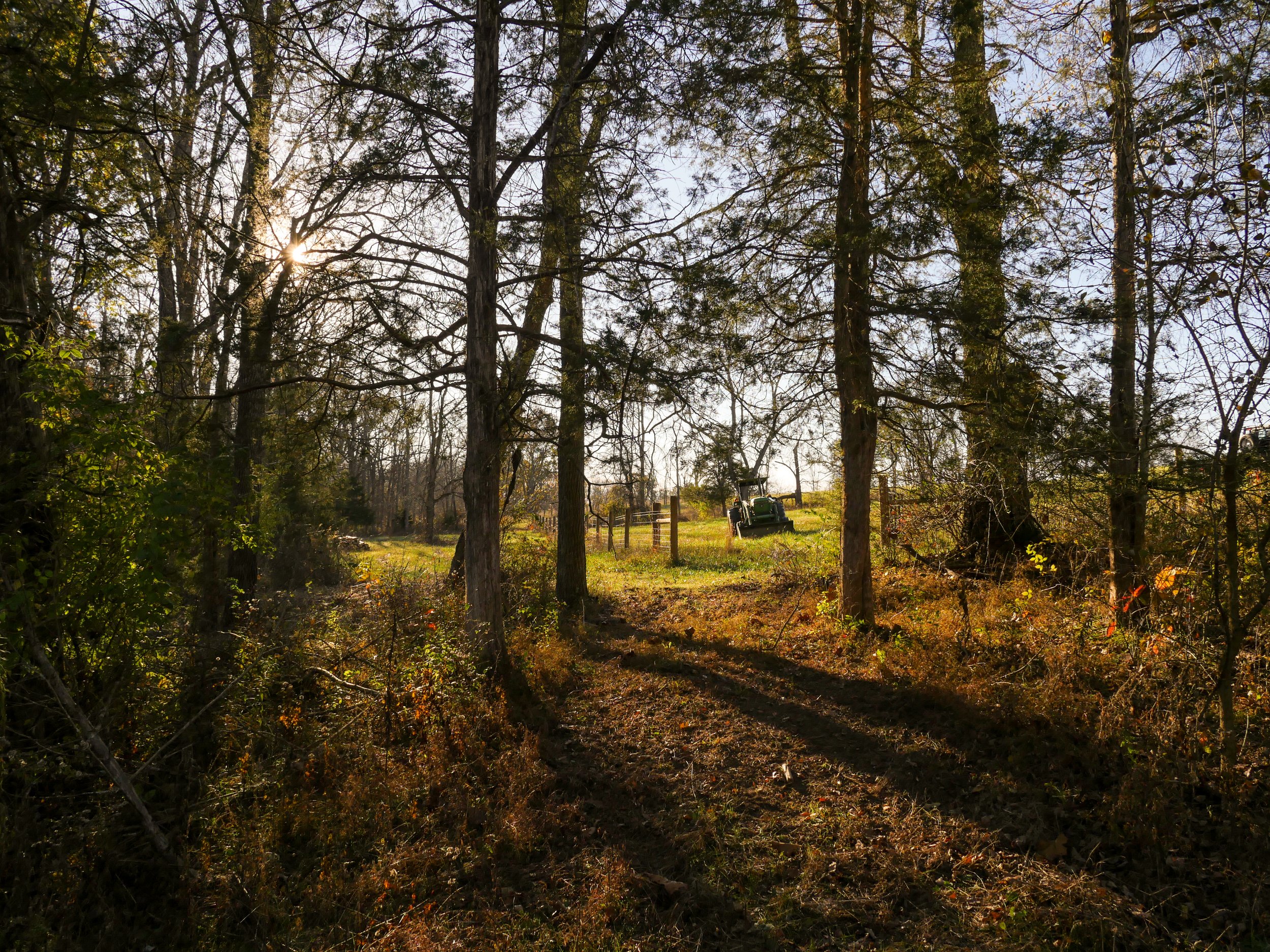Low-Impact Forestry Training Series
The courses and workshops in the Low-Impact Forestry Training Series bring participants into the forested areas of the farm to gain a fresh perspective on what assets the woodlands contain.
Logs to Lumber
May 10, rain date reschedule (workshop full, waitlist option)
Cost: $50
This one-day workshop is designed for individuals interested in learning how to utilize a farm tractor forestry winch to haul timber from the woods and to operate a portable sawmill to turn logs into lumber. Participants will delve into topics such as: utilizing a farm tractor winch for log handling and transportation, log selection and preparation, log scaling, operating a simple bandsaw mill effectively, understanding sawing techniques for different lumber products, ensuring safety protocols during the milling process, and maximizing the use of lumber produced. By the end of this workshop, participants will have the skills and knowledge to confidently transform logs into lumber using a portable sawmill and farm tractor winch, adding value to their farm operations and projects. *Limit 4 participants.
Woodland Tools and Their Applications
Returning for Fall 2025
Cost: $150
This three-day workshop offers training for the selection, care, maintenance, and use of traditional forestry tools and equipment. The course is appropriate for anyone who has no or very little experience working with woodland tools and would like to learn the fundamentals necessary to perform woodland work. *Limit 4 participants.
Hand tools for woodland work, highlighting forest axes, crosscut saws, scythes, and human-powered log-moving systems. Beginning at the workbench, we will: learn axe design and edge geometry, how to choose the right axe for specific uses and sharpening systems to create a strong, working, and long-lasting cutting edge. Then, we head to the woods to learn chopping, tree felling, and de-limbing techniques.
Power chainsaws as a woodland tool. After a thorough safety training, we will use the chainsaw in the log yard to buck to length trees that are on the ground; then, we head to the woods to do the same work. We will explore the effectiveness of a chainsaw in removing non-native invasive species such as bush honeysuckle. Learned safe operating procedures will guide the felling of smaller diameter trees as part of a woodland stand improvement plan.
Moving wood from the woodlot to the processing area using human power and a tractor with a forestry winch to extract logs from the woods to the log yard. In the log yard, we will use hand tools to hew logs into usable building timbers, utilize an Alaskan chainsaw mill to convert logs into lumber, and use a small bandsaw mill to make boards.
Chainsaw Skills Training: Introduction to Chainsaw Safety and Directional Felling
Fall 2025 workshop dates will be announced mid-July
Cost: $100
This intensive two-day training is appropriate for any woodland owner or farm worker operating a power chainsaw. The course introduces basic chainsaw maintenance, saw chain sharpening, personal protective equipment, professional tree felling techniques, limbing, and bucking trees to length. *Limit 4 participants per workshop.
Format: Each day, this training begins and ends in the shop and practice area where key discussion topics are covered; the practical portion of the course takes place in the woods.
Chainsaw Skills Training: Advanced Tree Felling
Returning Fall 2025
Cost: $100
This intensive two-day training is appropriate for farm woodland owners and farm workers interested in advancing their power chainsaw use to include felling difficult trees, bucking stems to maximize value, extraction of logs with a farm tractor and forestry winch, and removal of storm damaged-and-downed trees. *Limit 4 participants.
Prerequisite: completion of the Introductory workshop or permission of the instructor.
Format: Each day, this training begins and ends in the shop and practice area where key discussion topics are covered; the practical portion of the course takes place in the woods.
Practical Farm Woodland Management
Returning course in Fall 2025
Cost: $150
This three-day course provides landowners a practical approach to working with woodlands. Through a blend of classroom experiences and hands-on field work, landowners are guided in skills required to make a functional woodland plan based on sensible management decisions.
Format: Prior to the course, participants will work with the instructional staff to gather important information about their woodlands; following the course, the instructor will provide two, one-on-one coaching sessions (either in person if the property is nearby or remotely via zoom or telephone) as participants return home and begin this work. Topics include assessing your woodland’s potential by developing personal and practical objectives for your wooded property, management planning and taking a woodland inventory, mapping and basic surveying, woodland management techniques including managing for elements such as wildlife habitat improvement and non-timber forest products, financial aspects of woodland management, and types of external financial support available to support woodland work.
*Limit 8 participants (registration closed 12/10)
Woodland Management for Wildlife Habitat
Returning in Fall 2025
Cost: $25
This half-day workshop is for individuals looking to enhance wildlife habitat on their woodlands through effective management techniques. Participants will delve into topics such as understanding wildlife species and their habitat requirements, assessing current woodland conditions, implementing sustainable forestry practices to promote biodiversity, creating wildlife corridors and shelter belts, managing invasive species for habitat improvement, and incorporating wildlife-friendly practices into woodland stewardship. By the end of this workshop, participants will gain the knowledge and practical skills needed to optimize their woodlands for wildlife habitat improvement while fostering a healthy and diverse ecosystem. *Limit 8 participants.


![[photo by Ben Aguilar] Three people on the left work with a person on the right to make sure a log is placed correctly on a portable sawmill.](https://images.squarespace-cdn.com/content/v1/634f02e629cad13894354f54/90978793-1b3d-4e6a-8dfe-b9628b739e5a/Logs+to+Lumber+10-26-24-2.jpg)






